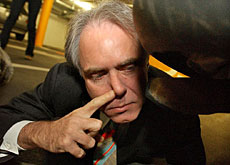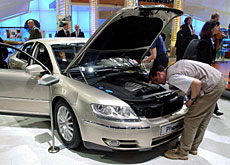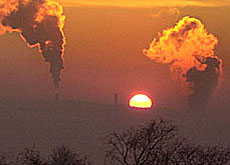Swiss urged to shun high-emission cars

Swiss consumers are being challenged to buy environmentally friendly cars, as part of a new government push to stem the sale of gas-guzzlers.
Car dealers are now required to rank new cars according to their fuel efficiency, as part of efforts to meet the country’s commitments to the Kyoto Protocol.
Moritz Leuenberger, the Swiss transport minister, on Monday said the measure was designed to help Switzerland reduce its annual carbon dioxide (CO2) emissions.
Under the Kyoto Protocol on climate change, emissions must be cut below 1990 levels by 2010.
Private vehicles, along with other forms of transport, account for more than 30 per cent of the country’s yearly CO2 emissions.
By 2008, the government wants to reduce the average fuel consumption of new cars by 24 per cent from 8.4 litres per 100 kilometres to 6.4 per 100km.
TV campaign
Already common on electrical goods, the new energy stickers provide data about fuel consumption rates, CO2 emissions and energy efficiency.
Urban and environmentally friendly vehicles will be awarded an A ranking, while the least efficient will be condemned with a G ranking.
Government regulations also require car dealers to display or mention the energy stickers whenever putting up a price list of new models, in advertisements and during a sales pitch.
The authorities are also launching a series of TV and newspaper advertisements to explain the new scheme.
Tax threat
Leuenberger said the energy stickers were just the first step in tackling the environmental impact of Switzerland’s 3.6 million vehicles.
The government has not ruled out the possibility of imposing a CO2 tax on fuel sales should Switzerland fall short of its reduction targets.
Nevertheless, the Swiss approach is considerably gentler than that of the German government’s, which has imposed a tax regime to reward consumers who opt for environmentally friendly cars and punish those who jump into big four-wheel drives.
Leuenberger said he preferred to give consumers a chance to voluntarily choose efficient vehicles, and would not make a decision on the proposed tax before year’s end.
The government also wants to increase the sale of diesel-powered cars, which use less fuel than regular vehicles.
Only 18 per cent of new cars sold in Switzerland run on diesel, compared with rates of almost 50 per cent in other European countries.
Funding alternatives
Worried by the potential impact of a CO2 tax, which some analysts fear could be as high as SFr0.20 per litre, the Swiss petroleum association recently launched its own initiative to reduce CO2 emissions.
The plan centres on a fund, financed by an SFr0.01 fuel tax that would invest in emission-reduction schemes such as car-pooling or alternative fuel research.
Sonya Studer, from the association, said the fund could also be spent on CO2 reduction programmes abroad, enabling Switzerland to earn carbon credits if, and when, a global trading system is introduced.
“The climate problem is something that should be tackled globally,” Studer told swissinfo.
Potential projects include wind farms in India, bio-fuel research and funding for so-called carbon sinks such as forests.
“We have worked out a business plan and presented it to the government,” Studer said.
Green support
The environmental group, WWF, has given “in principle” support to the new sticker system, but added that it needed to be carefully monitored.
Tony Wohlgensinger, president of the Swiss importers association Auto Schweiz, believes the energy stickers will have a positive impact on consumers.
“We are confident that there [will] be an influence on the buyer, and that he will consider the efficiency of a car more than he did before,” Wohlgensinger told swissinfo.
swissinfo, Jacob Greber and Jonathan Summerton

In compliance with the JTI standards
More: SWI swissinfo.ch certified by the Journalism Trust Initiative


You can find an overview of ongoing debates with our journalists here. Please join us!
If you want to start a conversation about a topic raised in this article or want to report factual errors, email us at english@swissinfo.ch.